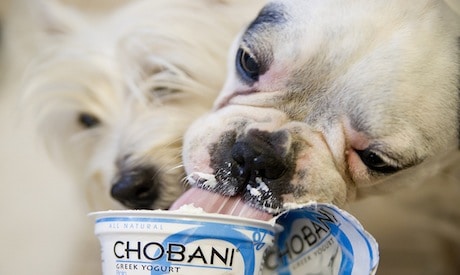
After being under the microscope in recent weeks as a result of a campaign launched by the consumer advocacy group GMO Inside over misuse of the term "natural" on its Greek yogurt, Chobani is now being forced to recall products due to mold contamination. Except, the company doesn't want to call it a recall.
According to the International Business Times, Chobani officially announced a recall earlier this week after initially saying it would not conduct a recall on the moldy yogurt. "Chobani[…]has asked certain supermarkets across the United States to remove some of its yogurt cups from shelves due to an issue with “swelling or bloating” that may have been caused by mold."
Chobani's decision to voluntarily recall over “isolated quality concerns” only came after the FDA said it was beginning an investigation on the issue after receiving numerous complaints from customers who claimed they ate the moldy yogurt and became sick.
Read more about Chobani
The products in question have the code: 16-012 and expiration dates between 9/11/2013 and 10/7/2013.
Chobani, the nation's best-selling brand of Greek yogurt, released a statement on its Facebook page stating: "There is nothing more important to us than the quality of our products. We're currently in the process of voluntarily removing some from shelves that simply weren't up to snuff.” Chobani's Twitter account tweeted to a customer who complained about being disturbed by the recall: “We didn’t recall any of our products. We’re voluntarily swapping out products that didn’t meet our rigid standards.” Even the retail giant, Kroger, came to Chobani's defense, with a
company spokesperson stating in an e-mail to the AP that the
contaminated products were not "a food safety issue."
Chobani's denial and erratic behavior over what is clearly a food safety and quality issue only further illustrates the misrepresentation and lack of integrity being pointed to in the GMO Inside campaign. The focus on semantics is disturbing, if not outright dangerous. Telling a consumer products weren't recalled in the midst of an investigation is irresponsible. Why not err on the side of extreme caution? But denial is business as usual for Chobani.
With a USDA pilot program on its hands that could lead to Chobani yogurt placement in every school in the country, it's no wonder the company is more image-concerned than ever. And willing to twist the truth.
Using the term "natural" on its yogurts has earned Chobani real estate at Whole Foods market even despite the fact that all of its dairy comes from cows who were fed genetically modified grains. Major food manufacturers have been sued recently for using the term "natural" to describe foods that contain GMOs, because the process of genetic modification is not naturally occurring and must be created in a laboratory setting, according to the World Health Organization.
Chobani misrepresented its sugar content as well, stating that most of the sugars in its yogurts come from the dairy and fruit, but a 2012 consumer lawsuit said the company's 'no sugar added' claims violated federal law. Obviously, English isn't Chobani's first language, as the company seems to have ongoing issues with what words actually mean. (Even the products: "Greek" yogurt are made by a Turkish-owned company.) Let's hope all of it is just an innocent translation issue. Although it does seem more like a whole lot of sour milk. Read more about GMOs
Image: erban




